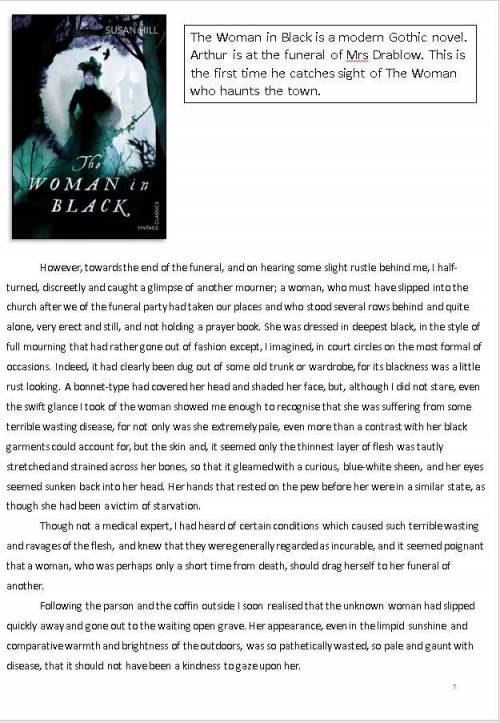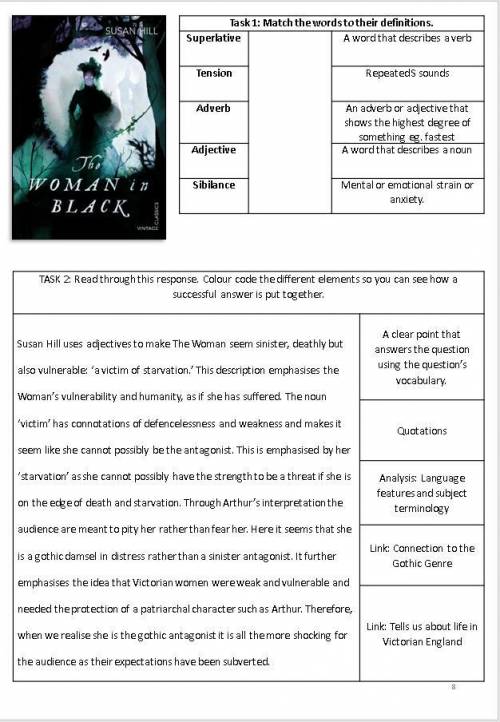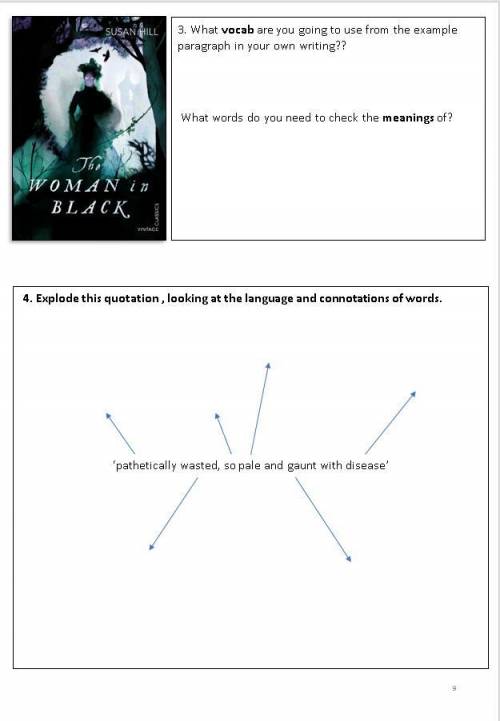
English, 04.05.2020 22:49 sanm378599
However, towards the end of the funeral, and on hearing some slight rustle behind me, I half-turned, discreetly and caught a glimpse of another mourner; a woman, who must have slipped into the church after we of the funeral party had taken our places and who stood several rows behind and quite alone, very erect and still, and not holding a prayer book. She was dressed in deepest black, in the style of full mourning that had rather gone out of fashion except, I imagined, in court circles on the most formal of occasions. Indeed, it had clearly been dug out of some old trunk or wardrobe, for its blackness was a little rust looking. A bonnet-type had covered her head and shaded her face, but, although I did not stare, even the swift glance I took of the woman showed me enough to recognise that she was suffering from some terrible wasting disease, for not only was she extremely pale, even more than a contrast with her black garments could account for, but the skin and, it seemed only the thinnest layer of flesh was tautly stretched and strained across her bones, so that it gleamed with a curious, blue-white sheen, and her eyes seemed sunken back into her head. Her hands that rested on the pew before her were in a similar state, as though she had been a victim of starvation.
Though not a medical expert, I had heard of certain conditions which caused such terrible wasting and ravages of the flesh, and knew that they were generally regarded as incurable, and it seemed poignant that a woman, who was perhaps only a short time from death, should drag herself to her funeral of another.
Following the parson and the coffin outside I soon realised that the unknown woman had slipped quickly away and gone out to the waiting open grave. Her appearance, even in the limpid sunshine and comparative warmth and brightness of the outdoors, was so pathetically wasted, so pale and gaunt with disease, that it should not have been a kindness to gaze upon her.




Answers: 3


Another question on English

English, 22.06.2019 02:40
Read the passage from sugar changed the world. sugar is a taste we all want, a taste we all crave. people throughout the planet everywhere have been willing to do anything, anything at all, to get that touch of sweetness. we even know exactly how thrilling it was to taste sugar for the first time. when the lewis and clark expedition met up with the shoshone, who had little previous contact with old world products, sacagawea gave a tiny piece of sugar to a chief. he loved it, saying it was "the best thing he had ever tasted." sugar created a hunger, a need, which swept from one corner of the world to another, bringing the most terrible misery and destruction, but then, too, the most inspiring ideas of liberty. sugar changed the world. we begin that story with a man who could never know enough. how does the conclusion of the prologue support the authors’ purpose? select two options. it introduces the topic that will be addressed next. it provides information about the authors. it states why the topic is relevant to readers. it cites sources the authors used in the text. it explains how the authors came to study the subject.
Answers: 1

English, 22.06.2019 03:20
If chopin were your music teacher, what techniques would he probably expect you to develop and practice? use details and information from the passage to explain your answer.
Answers: 3

English, 22.06.2019 04:50
Read the excerpt from hemingway’s a farewell to arms. we parked the cars beyond the brickyard. the ovens and some deep holes had been equipped as dressing stations. there were three doctors that i knew. i talked with the major and learned that when it should start and our cars should be loaded we would drive them back along the screened road and up to the main road along the ridge where there would be a post and other cars to clear them. which best describes hemingway’s style of writing in the excerpt? straightforward and simple, while still relating a lot of information to the reader long-winded and offering far too much information to the reader overly complicated, making it difficult to interpret and understand the text effortless and uncomplicated, with little meaning for the reader to interpret
Answers: 2

English, 22.06.2019 07:00
Wiesel's speech begins after auschwitz the human condition is not the same nothing will be the same identify where similar language is repeated later in his speech what is the effect of this repetition
Answers: 2
You know the right answer?
However, towards the end of the funeral, and on hearing some slight rustle behind me, I half-turned,...
Questions




Arts, 11.07.2019 06:30




Advanced Placement (AP), 11.07.2019 06:30







English, 11.07.2019 06:30

Biology, 11.07.2019 06:30


Mathematics, 11.07.2019 06:30


Mathematics, 11.07.2019 06:30



